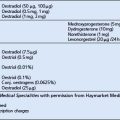CHAPTER 8 GASTROENTEROLOGY
DYSPEPSIA
Diagnosis
Management
Advice
Prescribing
For more significant symptoms
HELICOBACTER PYLORI
Tests for H. pylori
GASTRO-OESOPHAGEAL REFLUX DISEASE (GORD)
Management
Prescribing.
(Prescribe according to severity.)
COELIAC DISEASE
It should be considered especially if the patient also has:
Coeliac disease doubles the risk of GI tumours.
Diagnosis
Investigations
INFECTIVE DIARRHOEA
Management
Prescribing.
Indications for antibiotics are few, as they usually fail to influence the course of the illness and they can prolong and increase the frequency of the carrier state. Ciprofloxacin 500 mg bd for 5 days is occasionally used for prophylaxis against traveller’s diarrhoea, but routine use is not recommended. Antibiotics are, however, indicated for:
DIVERTICULITIS
Ninety-five per cent of diverticula are in the sigmoid colon.
IRRITABLE BOWEL SYNDROME
Management
Advice
CONSTIPATION
In children, a high-fibre/high-fluid diet is often sufficient treatment (see p. 88).



